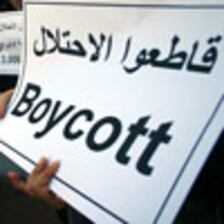The Electronic Intifada 14 November 2008
UNITED NATIONS (IPS) - A company that is a member of the UN Global Compact for corporate social responsibility has ties to production in an Israeli settlement on the West Bank considered illegal by the United Nations.
A spokesperson for the company, Vileda, an international household products firm, said he was unaware of the contract with a manufacturer in the West Bank, Plasto Polish. However, a representative of Plasto confirmed in a telephone interview with IPS that the company was a subcontractor for Vileda.
“Companies have a social as well as a legal responsibility and must therefore take no part in the illegal occupation,” Merav Amir of the Coalition of Women for Peace (CWP), told IPS. “In order to comply with international human rights law, companies should make sure that their businesses have nothing to do with the occupation.”
CWP is an Israeli feminist peace organization that carries out grassroots research, and has built a database with information about companies in industrial zones within the occupied territories. An IPS investigation revealed that Vileda appeared in both that database and the list of UN Global Compact participants.
Amir says companies located in the territories benefit from reduced taxes, little or no enforcement of labor laws, a captive labor market, very cheap real estate prices and lax enforcement of environmental regulations.
The UN Global Compact is intended to encourage businesses worldwide to adopt sustainable and socially responsible policies, and to report on their implementation. It stresses ten principles in the areas of human rights, labor, the environment and anti-corruption.
The corporate responsibility initiative sets out standards of behavior for companies that are closely corresponding to the international legal obligations of states. This includes, as a minimum, a duty for companies to fully respect international humanitarian and human rights law.
According to the Global Compact, companies should “support and respect the protection of internationally proclaimed human rights.”
Vileda, whose French division is a member of the Global Compact, subcontracts business to Plasto Polish, which manufactures and exports household cleaning products, mainly scouring sponges and cleaning pads. Plasto is located in the Barkan Industrial Zone, which is an Israeli settlement in the occupied West Bank.
On its website, Vileda says, “Our company and its family shareholders together are committed to protecting the environment and being responsible corporate citizens in all countries and communities in which we do business.”
Other companies have recently decided to move their facilities from the occupied territories, primarily to avoid negative publicity. The Dutch beer company Heineken has closed down its facility in the area Barkan and the Swedish lock company Assa Abloy also announced that its production unit on the West Bank will be moved after eight years of production.
According to international humanitarian law, all Israeli settlements on occupied Palestinian territory are illegal, whether built on state or private land. The settlements also constitute a major constraint on the peace process. This has been underscored by the international community through UN Security Council and General Assembly resolutions.
Matthias Stausberg, the Global Compact spokesperson, told IPS that the initiative is not in a position to monitor the member companies.
“Of course we want the companies to reflect the values and policies of the United Nations, but we need more information on this case to be able to comment it further,” he said.
“We do not expect the companies to be perfect when they join the Global Compact,” Stausberg explained. “It is more important that they are a part of the initiative so they can improve in the long run.”
He said that information about the companies is put in in a public database and then the public at large, civil society and the media can read and report when companies are not adhering the Global Compact principles.
“We could delist a company for human rights violations if it is brought to our attention and if the company is not willing to engage in dialogue. We do have that possibility,” he stressed.
The Global Compact currently has more than 6,200 participants, including over 4,700 businesses in 120 countries. In June, the Global Compact announced that 630 companies had been delisted for “failure to communicate progress.”
Israeli industrial zones within the occupied territories hold hundreds of businesses and factories, ranging from small businesses serving the local Israeli settlers to large factories which export their products worldwide.
In 1979, the UN Security Council determined that “the policy and practice of Israel in establishing settlements in the Palestinian and other Arab territories occupied since 1967 have no legal validity and constitute a serious obstruction to achieving a comprehensive, just and lasting peace in the Middle East.”
The Middle East Quartet — the European Union, the United Nations, Russia and the United States — has also expressed its collective opposition to the settlements and has, on 18 occasions since its inception, warned of the dangers of continued expansion to the process.
All rights reserved, IPS - Inter Press Service (2008). Total or partial publication, retransmission or sale forbidden.
Related Links


